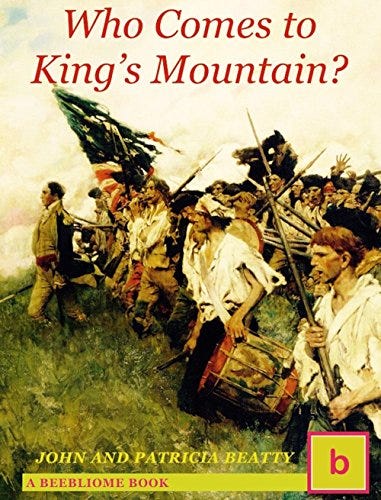#133: SC250: History of Rev. War General Andrew Pickens, American Revolution Traveling Exhibit, and "Who Comes to King's Mountain?"
For South Carolina history lovers far and wide! Published weekly on Monday mornings. Enjoy weekly SC history articles, upcoming SC historical events, and other South Carolina recommendations.
Dear readers,
Welcome to SC History Newsletter #133!
*I have an exciting announcement today!*
No doubt you have seen my enthusiasm building for the SC250 and the America250 (ha!) and over the past month or so, I have been thinking about how I can contribute to this momentous occasion coming up in a little over a year — on July 4th, 2026.
I am excited to announce that starting with today’s newsletter, I will be featuring “SC250”- related newsletters twice a month where I will be highlighting South Carolina Revolutionary War heroes, heroines, battles, historical sites, stories, and more. The newsletter title will start with “SC250” in these cases.
This past week, I spoke with the grants manager of the SC250 organization (who was very nice), and I will hopefully soon be submitting a grant to their funding committee to support my continued research efforts and to underwrite these 2x-monthly SC250 newsletters as we prepare for America’s 250th anniversary — so exciting!! Wish me luck!!
Also, a quick housekeeping note: a reminder that at the end of every email is a little survey asking for your review of the newsletter. Be sure to keep reviewing and providing me feedback so I can improve. :)
Thank you, as always, for being my wonderful subscribers! You inspire me to keep building the newsletter in new and exciting ways.
Now let’s learn from SC History!
Yours truly,
Kate
(Writing from Greenville, SC)
➳ Housekeeping for new subscribers!
New friends! If you are new to the newsletter, please note that there are over 100 previous SC History newsletters on topics ranging from the founding of Charleston, sunken Confederate submarines, railroad tunnels filled with blue cheese, and so much more! I encourage you to take a look at our archive here.
Send me your comments or topic ideas: I love it when subscribers write to me! Have a SC History topic or question you’d like for me to write about? Have additional ideas or feedback? Just reply to this email and let me know!
Join us on social: Keep the conversation going and join over 100 other subscribers by becoming a member of our SC History Newsletter Facebook Community here!
If your email “cuts off”: In your email app or website, if my emails “cut off” for you, please click the title of the email and it will take you to the full post on the Substack. I don’t want you to miss any content!
Love the SC History Newsletter? Please click the button below to share with a friend!
➳ Featured SC History Event of the Week:
February 20 - March 7 | “The American Revolution Experience Traveling Exhibit” | Historic Rock Hill | Rock Hill, SC | FREE & Open to the Public | Website
From the event website:
“What Would You Choose? ⚔️
The American Revolution Experience is opening on February 20th at the White Home, hosted by The Kings Mountain Chapter of Daughters of the American Revolution and the American Battlefield Trust.
This thought-provoking exhibit takes you back to the 1770s, where tensions ran high, and ordinary people had to make extraordinary decisions:
🌟 Would you risk everything for liberty?
👑 Or remain loyal to the British crown?
📅 See it before March 7th!
🕒 Hours: Monday-Saturday 10-4; Sunday 1-4”
As a perk for paid subscribers, click here or the button below to visit my full SC History Events Calendar that organizes all the upcoming SC history events I have discovered. Please let me know if you’d like to add an event to the calendar! Reply to this email to send me your events.
➳ Other SC History Recommendations
BOOK: “Who Comes to King's Mountain?” by John Louis Beatty and Patricia Beatty
(Note from Kate: Thank you for this book recommendation from our subscriber Scott B.! We had a really fun discussion in our SC History Newsletter Facebook Group (click here to join!) last week about people’s favorite SC-centric books. Be sure to check it out on FB!)
Book Summary:
Living in the South Carolina hills in 1780, a young Scottish boy, whose own family is divided between Loyalist and rebel, must decide for himself which side he will follow.
Helpful book reviews from Amazon:
“First, it must be said the authors knew their material - given their historical and educational background this is no surprise. The rendition of daily life and culture of 18th century settlement society in the Carolinas - all are told fairly well, and the "on camera" appearances of real historical characters seem fairly true to life. Secondly, for its era it's very even handed. The 1970's were full of iconoclastic venom aimed at American's founding legends, but this is thankfully NOT one of those works. The horror of the Revolutionary War as it unfolded in the southern theater is on full display, but the authors are grinding no ideological axes in the piece. The scrying of the herbwife character carries a bit of an air of 70's-era fascination with the paranormal, but it's not too terribly distracting.” —Jennifer
“This book is an excellent way to introduce kids (of all ages) to the brutal realities of war. It also is wonderful because it portrays the reluctance of ordinary people to get involved with war; as with the Civil War, there were individuals who would rather stay at home than fight for a cause with which they could not identify. The character of Alec is well crafted and one with which young readers can identify. The themes of the book involve issues that adolescents are dealing with themselves. Alec is searching for identity and an authority figure to whom he can look up to and respect. He uses his wits to get out of sticky situations and rejects violence as a means to better his own situation. Although this book is long for an average young reader, I highly recommend it. As an adult, I value the message (war is not always glorious, violence is not always the answer to problems), and so will young readers.” —Meredith L.
➳ SC History Topic of the Week:
The History of General Andrew Pickens
Andrew Pickens (1739-1817) was a prominent Revolutionary War officer & patriot of South Carolina but was originally born in Pennsylvania on September 15th, 1739.
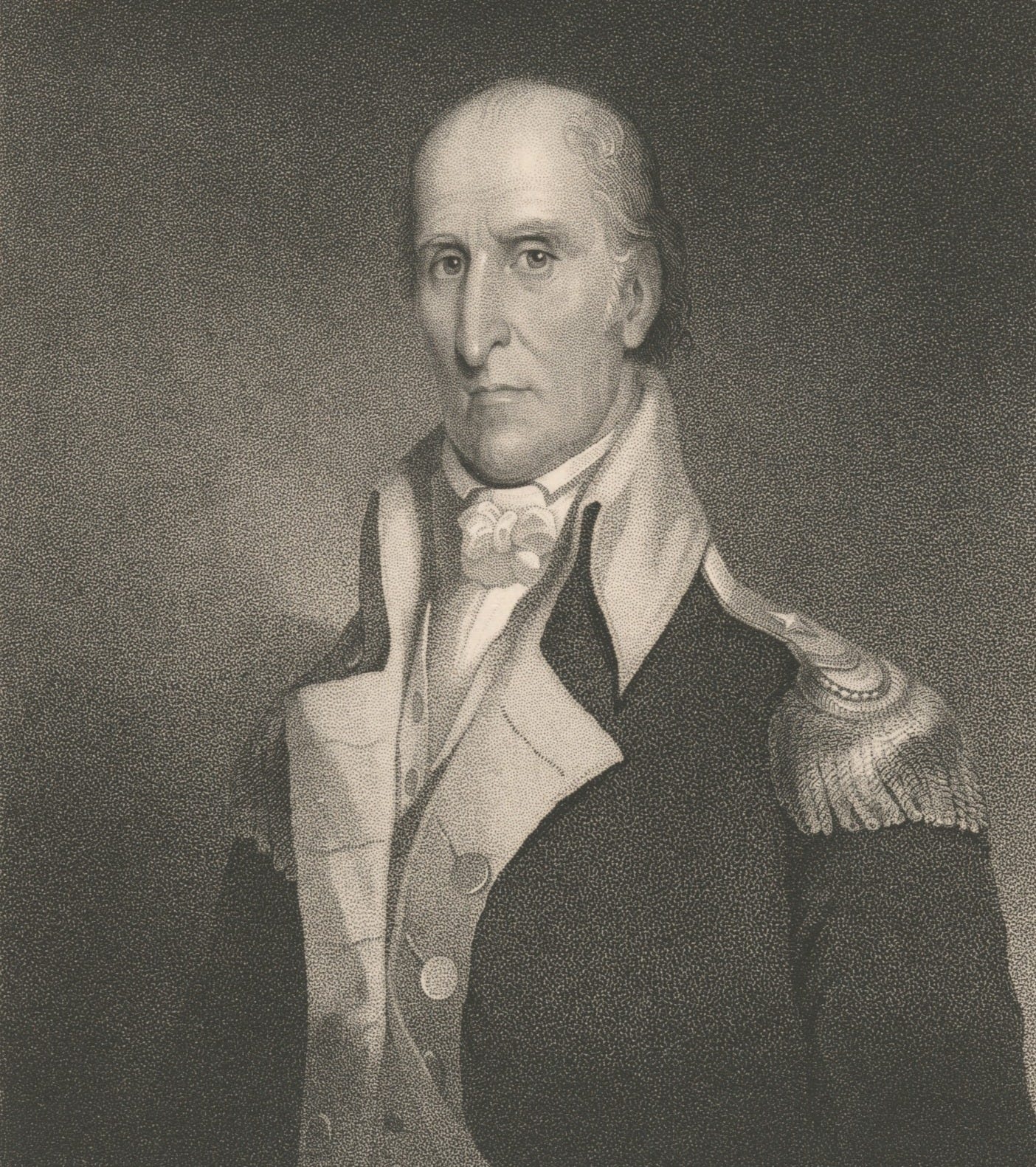
His family was of Huguenot & Scots-Irish descent. The Pickens family came from Northern Ireland first to Pennsylvania, and then moved their family down the famous “Great Wagon Road” and settled in South Carolina, where they lived at Waxhaw Creek by 1752.
As a young man, Andrew Pickens started his career as an officer in the Cherokee War of 1759-1761.
Pickens survived the war and afterward moved to the Long Cane Creek settlement in Abbeville County and married Rebecca Floride Calhoun on March 19th, 1765.
Many of us will recognize the famous last name of Calhoun. By marrying Rebecca Floride Calhoun, Andrew Pickens became an uncle by marriage to the famous future South Carolina politician John C. Calhoun (1782-1850).1
Where the couple lived — in the South Carolina backcountry — was a dangerous place rife with conflict between the white settlers and the native tribes.
An interesting historical tidbit about Pickens’ wife Rebecca: during the Long Canes Massacre on February 1, 1760 when the Cherokee Indians attacked white settlers and their slaves, “Rebecca [age 15] hid for three days in the long canes to escape the Cherokee who killed her grandmother, Catherine Montgomery Calhoun.” Note: in the South Carolina back country, “long canes” were thickets of giant grasses that were native to the region, resembling bamboo.

Pickens and Rebecca had 12 children and their well-matched union “forged ties with several prominent backcountry families.”2
During this time, Pickens built a “blockhouse” to defend against Indian attacks and it was also used as a base for Indian trading.
Pickens was a “successful farmer” and also served as a local justice of the peace.3
As rumblings of Revolution spread north from Charleston to the backcountry, Pickens, and many of his Scots-Irish neighbors were passionate about the Patriot cause.
When the American Revolution began, Pickens was a leader of the Patriot forces of the South Carolina backcountry. He initially served as the militia company commander for the Ninety-Six District and he fought against British-sympathizing Loyalists in late 1775.
It is disturbing to think how the Revolutionary War pitted neighbor against neighbor. Writing on Mount Vernon’s website, Shannon Duffy of Texas State University wrote:
“The Revolutionary War was also in many ways a civil war. Approximately one-fifth of Americans supported Britain during the Revolution, although their exact numbers are uncertain due to the inherent difficulty in determining who qualified as a "Loyalist."4
In 1778, Pickens gained the rank of colonel for the Upper Ninety-Six Regiment and he participated in campaigns against the British-allied Cherokee Indians and “the unsuccessful American invasion of British East Florida.”5
On February 14th, 1779 (wow, almost exactly 246 years ago to the day!), Pickens and his militia combined forces with Colonel Elijah Clark of Georgia and together, they defeated the Loyalists of the South Carolina backcountry. This victory dealt a heavy blow to the British, who (it turned out) only had only a fragile hold on the backcountry of South Carolina.
In 1780, when the British overtook Charleston, “Pickens took British protection and was paroled to his home.”6
Unfortunately while Pickens was under British protection, Loyalists still plundered his home.
As the Revolutionary War raged on, Pickens then went on to serve at the Battle of Cowpens on January 17th, 1781, where he commanded his militia towards a decisive victory against Lt. Col. Banastre Tarleton's British and loyalist forces.
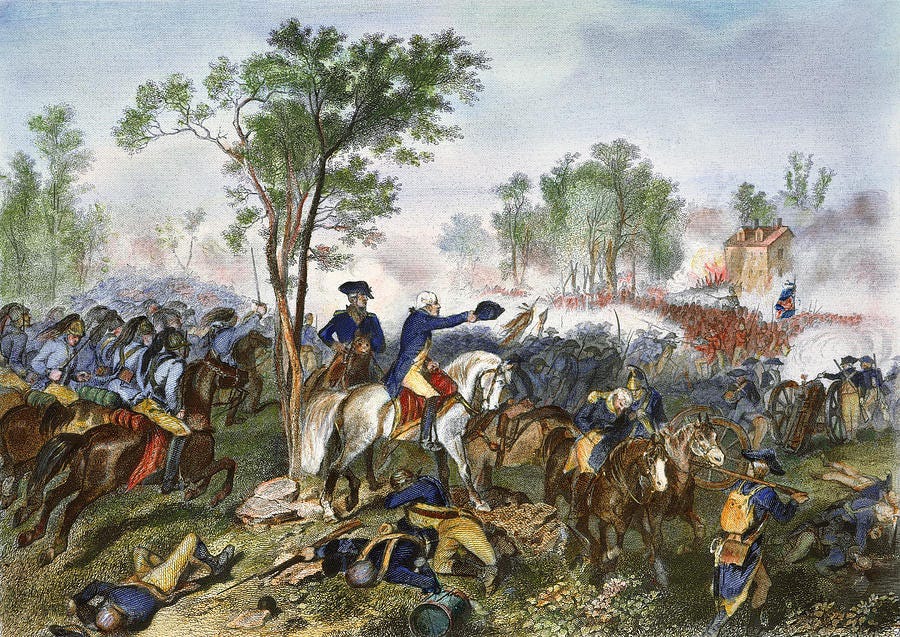
From his backcountry dealings with the native tribes, Andrew Pickens “borrowed heavily from Cherokee warfare skills” and it was those specialized skills that helped the patriots secure their victory at Cowpens.7
For his "spirited conduct" at Cowpens, the Continental Congress presented Pickens with a sword and the State of South Carolina promoted him to Brigadier-General in the state militia.
Pickens then worked closely with General Nathanael Greene's Continental Army as the forces targeted and captured isolated British posts in the South Carolina interior.
Pickens was wounded at the Battle of Eutaw Springs in September 1781. When he recovered, Pickens went on to wage “two punitive campaigns” against the Cherokee Indians in mid-1782.8
While Andrew Pickens’ contributions to the Revolutionary War were remarkable, his post-War life was just as impressive.
Per the Anderson County Museum: “While best known for his military accomplishments, Andrew Pickens was also a leader in politics, religion, and community building.”
After the war, Pickens became a legislator and a negotiator with Native American tribes.
He acquired land on the South Carolina frontier on the banks of the Keowee River, across from the old Cherokee town of Isunigu (now Seneca, SC).
On his property, he established his 593-acre Hopewell Plantation and lived life as a member of the “backcountry elite.”

Built about 1785, the Hopewell Plantation house is representative of a rural house in the late 18th and early 19th century in the South Carolina backcountry. Beginning as a small log structure, Hopewell was substantially enlarged by Pickens and was his plantation home for about 20 years (1785-1815).
Today, the Hopewell Plantation House is owned by Clemson University, where it continues to serve as a working farm.9
The restoration of the Hopewell plantation home was funded through the sponsorship of the Andrew Pickens Chapter, National Society Daughters of the American Revolution, and matching gifts in support of Hopewell to the Clemson University Foundation.10
Pickens represented the Ninety-Six District in the state House of Representatives from 1776 to 1788 and Pendleton District in the state Senate from 1790 to 1793.
In the legislature, Pickens worked to “establish schools, churches, and a legal system for the South Carolina backcountry.”11
Andrew Pickens was an expert negotiator with Native American tribes and was known as a leader on Indian affairs.
Pickens served as a federal commissioner to negotiate peace with the Cherokees, Chickasaws, Choctaws, and Creeks in the late 1780s.
In fact, General Andrew Pickens led negotiations of the peace on his Hopewell plantation land. The “Hopewell Treaties” were signed between the United States of America and the Cherokee (November 28, 1785), the Choctaw (January 3, 1786), and the Chickasaw (January 10, 1786) respectively. The Creeks chose not to participate in the peace negotiations at Hopewell.12
The peace talks happened near what would become known as the “Treaty Oak” which “stood witness to these Hopewell Treaties” and survived into the early 20th century, but was eventually lost in a storm.
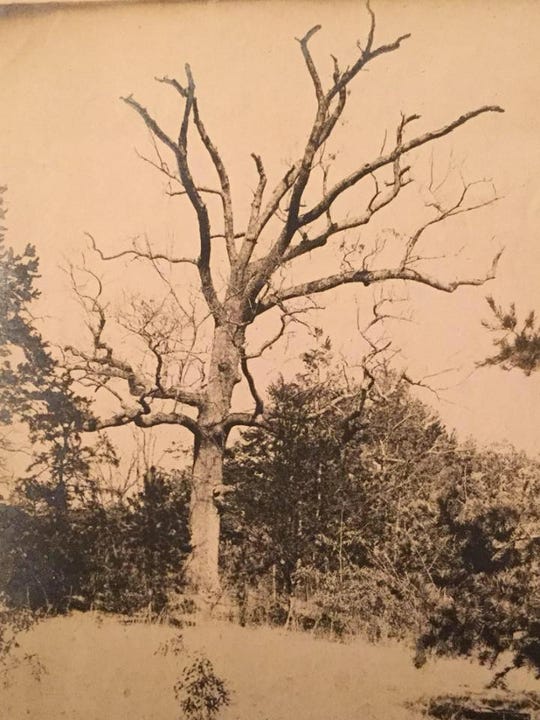
The Hopewell Treaty Oak (Image Source: Clemson.edu)
Pickens served two more terms in the General Assembly from 1796 to 1799, representing Pendleton District.
During his time in public service, Pickens had the honor of having two private dinners in Philadelphia with President George Washington.13
Pickens was also a devout Presbyterian, and he was a founding elder of the Old Stone Church in Clemson, SC.
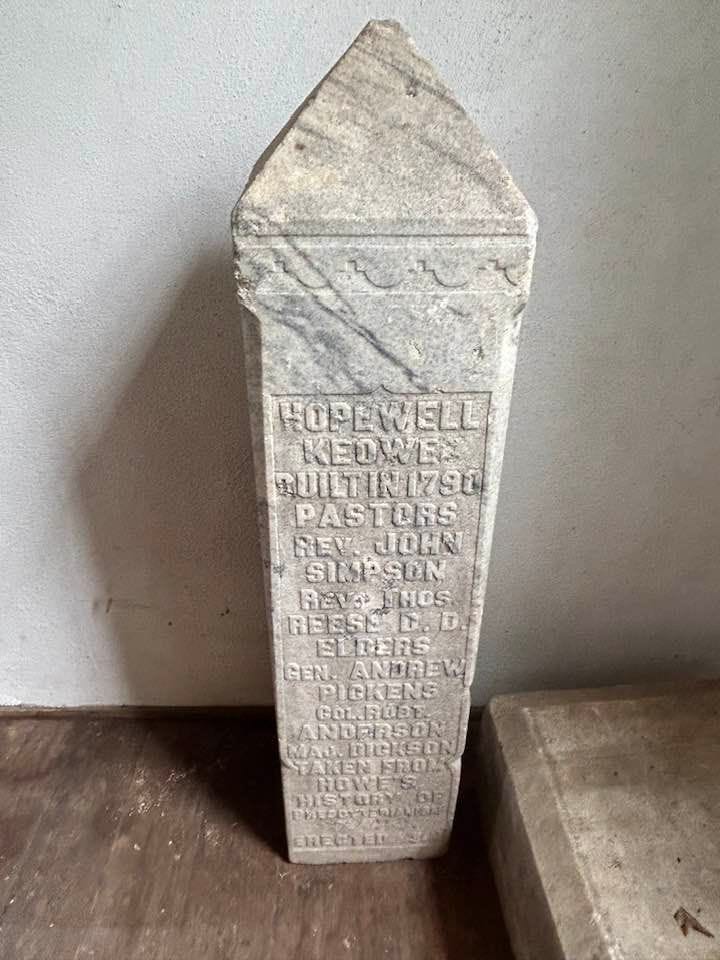

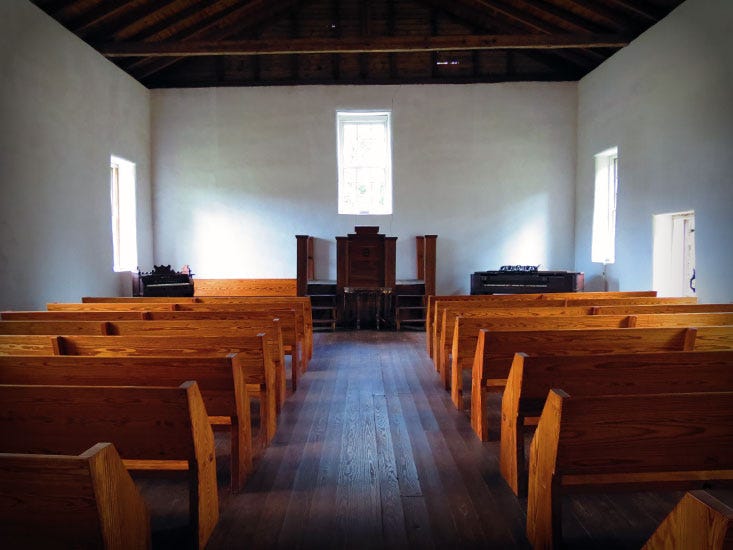
From Dennis Chastain of the Greenville Journal:
“I’ll be the first to admit that he [General Andrew Pickens] was not much to look at, and probably not somebody you would want to sit down and have a beer with, but he was a man of character. He never bragged or boasted about his military career or any of his other extraordinary accomplishments. Quite the contrary. Historians are often frustrated that he left so little in terms of a documentary record of his life story.
It is clear, however, that the strength of his character came from his deep and abiding faith. He didn’t just wear his Christian faith on his sleeve, it was at the core of his being. He conducted daily devotions in times of war and peace, and was among the founding elders of several churches. It was his faith that stiffened his spine at times when lesser men would have wilted under dire, life or death, circumstances.”
Andrew Pickens retired to his plantation in 1805, coming out of retirement only briefly in 1812 when elected to a final term in the General Assembly to prepare South Carolina for the war of 1812.
As he entered his twilight years, Andrew Pickens was often visited by Cherokee warriors and tribal leaders who had become his friends. These Indian leaders showed their esteem for Pickens by calling him a special name: Skyagunsta, meaning “Wizard Owl.”14
Pickens died at his plantation on August 11th, 1817 at the age of 78 (a long life!), and was buried with his family at the Old Stone Church Cemetery.

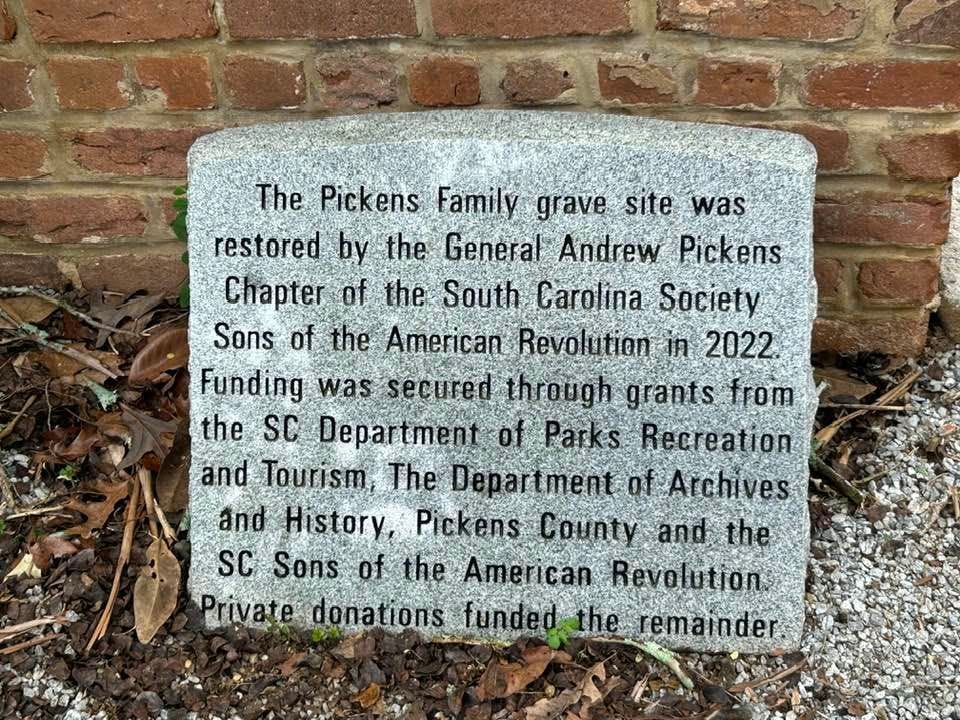
Andrew Pickens’ grandson Francis Wilkinson Pickens followed his grandfather’s footsteps into politics and was governor of South Carolina from 1860 to 1862. He led the state through secession and the early years of the Civil War.
The Pickens name lives on in our South Carolina geography. Pickens County was named for General Andrew Pickens in 1828 and the town of Pickens, SC was founded in 1868 and also named after the general.
Let’s end today’s essay with what was written on General Andrew Pickens gravestone:
“Gen. Andrew Pickens (was born 15th September 1729 and died 11th August 1817)
He was a Christian, a Patriot, & Soldier:
His Character & actions are incorporated with the history of his Country.
Filial affection & respect raise this Stone to his memory.”
Do you live in Pickens, SC or Pickens County? In what ways is General Pickens’ story alive and well in the area?
If you voted just “OK” on the newsletter today, I want to hear from you: what would you suggest I improve for next time? Please leave a comment below:
➳ Sources — The History of General Andrew Pickens
"Anderson County Museum: General Andrew Pickens – 2009 Hall of Fame." Anderson County Museum, https://andersoncountymuseum.sc.gov/general-andrew-pickens-2009-hall-fame. Accessed 13 Feb. 2025.
"Andrew Pickens." American Battlefield Trust, https://www.battlefields.org/learn/biographies/andrew-pickens. Accessed 14 Feb. 2025.
"Andrew Pickens and Rebecca Calhoun: An Old Stone Church Photographic Essay." Begats and Bequeathals: A Southern U.S. Family Documented, 12 May 2024, https://begatsandbequeathalsasouthernusfamilydocumented.com/2024/05/12/andrew-pickens-and-rebecca-calhoun-an-old-stone-church-photographic-essay/2/. Accessed 13 Feb. 2025.
"Andrew Pickens Wins the Ring Fight." California Society, Sons of the American Revolution, 8 Aug. 2023, https://www.californiasar.org/2023/08/andrew-pickens-wins-the-ring-fight-2/. Accessed 14 Feb. 2025.
"Andrew Pickens." National Park Service, https://www.nps.gov/people/andrew-pickens.htm. Accessed 13 Feb. 2025.
"Andrew Pickens." National Park Service, https://www.nps.gov/articles/000/andrew-pickens.htm. Accessed 14 Feb. 2025.
"The City of Pickens, South Carolina." City of Pickens,
https://www.cityofpickens.com/?SEC=62DA73E5-0D25-46CF-9243-C82D8EB741BB#:~:text=The%20town%20of%20Pickens%20was,who%20lived%20among%20the%20Cherokees
. Accessed 14 Feb. 2025.
"Hopewell Plantation." South Carolina Picture Project, https://www.scpictureproject.org/pickens-county/hopewell-plantation.html. Accessed 13 Feb. 2025.
"John C. Calhoun Biography." Clemson University, https://www.clemson.edu/about/history/bios/john-c-calhoun.html. Accessed 13 Feb. 2025.
"Hopewell Plantation." Clemson University, https://www.clemson.edu/about/history/properties/hopewell/. Accessed 14 Feb. 2025.
"Old Stone Church." Old Stone Church, https://oldstonechurchsc.com/about-old-stone-church/. Accessed 14 Feb. 2025.
"Pickens, Andrew." South Carolina Encyclopedia, https://www.scencyclopedia.org/sce/entries/pickens-andrew/. Accessed 13 Feb. 2025.
"Rebecca Calhoun Pickens." Women's History Blog, 11 May 2011, https://www.womenhistoryblog.com/2011/05/rebecca-calhoun-pickens.html. Accessed 14 Feb. 2025.
"The Forgotten Story of Andrew Pickens: Field Notes with Dennis Chastain." Greenville Journal, https://greenvillejournal.com/outdoors-recreation/the-forgotten-story-of-andrew-pickens-field-notes-with-dennis-chastain/#:~:text=I'll%20be%20the%20first,%2C%20life%20or%20death%2C%20circumstances. Accessed 13 Feb. 2025.
https://www.clemson.edu/about/history/bios/john-c-calhoun.html
https://www.nps.gov/people/andrew-pickens.htm
https://www.womenhistoryblog.com/2011/05/rebecca-calhoun-pickens.html
https://www.mountvernon.org/library/digitalhistory/digital-encyclopedia/article/loyalists
https://www.nps.gov/people/andrew-pickens.htm)
https://www.nps.gov/people/andrew-pickens.htm
https://home.nps.gov/cowp/learn/historyculture/andrewpickens.htm
https://www.nps.gov/people/andrew-pickens.htm)
https://www.scpictureproject.org/pickens-county/hopewell-plantation.html
https://www.theeasleyprogress.com/news/7086/public-invited-to-celebrate-historic-hopewell-plantation-porch-restoration
https://www.nps.gov/people/andrew-pickens.htm
https://www.clemson.edu/about/history/properties/hopewell/#:~:text=Pickens'%20residency%2C%20the%20land%20holdings,of%20enslavement%20in%20Pendleton%20District.
https://greenvillejournal.com/outdoors-recreation/the-forgotten-story-of-andrew-pickens-field-notes-with-dennis-chastain/
https://greenvillejournal.com/outdoors-recreation/the-forgotten-story-of-andrew-pickens-field-notes-with-dennis-chastain/#:~:text=I'll%20be%20the%20first,%2C%20life%20or%20death%2C%20circumstance)











